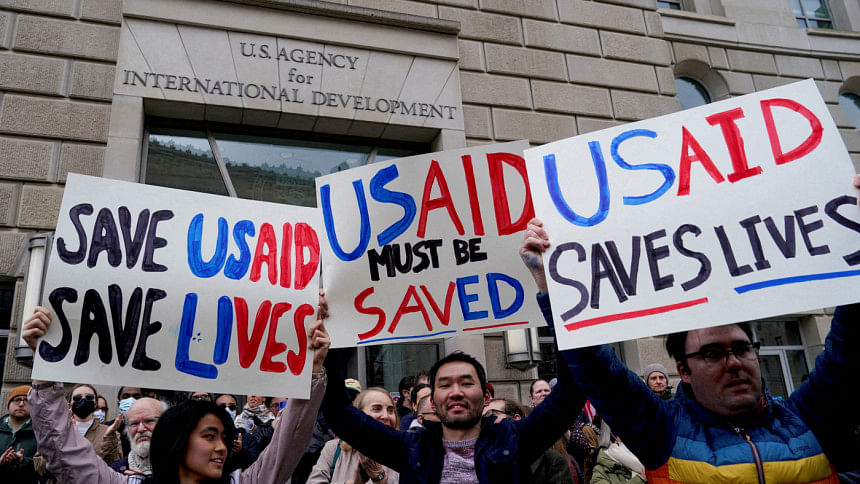US aid cuts may weaken democratic transition in South Asian countries: report

The Trump administration's recent foreign aid cuts could weaken democratic governance in Bangladesh and other South Asian countries while providing China with an opening to expand its authoritarian influence, according to a new report.
The Center for a New American Security (CNAS), a Washington-based thinktank, published the report titled "Democracy in South Asia amid US aid cuts: what's at stake for Great Power Competition" on May 15.
It says Bangladesh is undergoing a profound political and social transition in the wake of the August 2024 student-led protests that saw the ousting of Prime Minister Sheikh Hasina and the Awami League.
Under Sheikh Hasina's rule from 2009 to 2024, Bangladesh experienced a growing erosion of its democratic institutions. The current interim government, led by Chief Adviser Muhammad Yunus, has set up reform commissions to make recommendations for improving the democratic process in the country, the analysis said.
However, despite the promise of democratic renewal, significant challenges persist, including stalled elections, retribution politics, continued corruption, and threats to secularism. These issues have raised critical questions about Bangladesh's future, the report said.
"The Hasina government relied on corruption, intimidation, and repression to rule, and there are growing concerns that a shift to BNP leadership under Tarique Rahman, the exiled interim chair of the BNP, would result in a continuation, or even deepening, of the same undemocratic practices," it added.
There is also concern that some members of the student movement, including those affiliated with the Islamic Jamaat-e-Islami, will try to make sweeping changes before elections that would involve enshrining Islamic values and traditions into the constitution, posing a threat to Bangladesh's secular and egalitarian traditions, the CNAS report adds.
It said in recent years, China has significantly expanded its influence in Bangladesh through a range of economic and security investments. Under Hasina's rule, China invested nearly $26 billion in Bangladesh from 2016 to 2022.
While Bangladeshis largely welcomed Chinese investments, the report says concerns persist about the transparency and sustainability of these deals.
Following the expulsion of Hasina, China moved quickly to make political inroads across the political spectrum in Bangladesh, and the US cuts to foreign aid to Dhaka will create a further vacuum for Beijing to exploit, it added.
Chinese diplomats have been developing close relations with both the interim government and, notably, the Jamaat-e-Islami party, the report said.
It says the US has provided significant assistance to Bangladesh in areas such as human rights, governance, development aid, and military cooperation. USAID contributed nearly $300 million annually and $500 million in 2024 alone in Bangladesh's health, agriculture, economic reforms, and disaster relief efforts.
The report said US assistance aimed at specifically supporting governance in Bangladesh has totalled over $800 million from 2005 to 2024.
"Halting these programmes in Bangladesh undermines America's ability to support a fragile democratic partner as it undergoes a critical period of political transition.
"The international community, particularly the US, must actively support Bangladesh's political transition with both diplomatic support and tangible assistance."

 For all latest news, follow The Daily Star's Google News channel.
For all latest news, follow The Daily Star's Google News channel. 



Comments